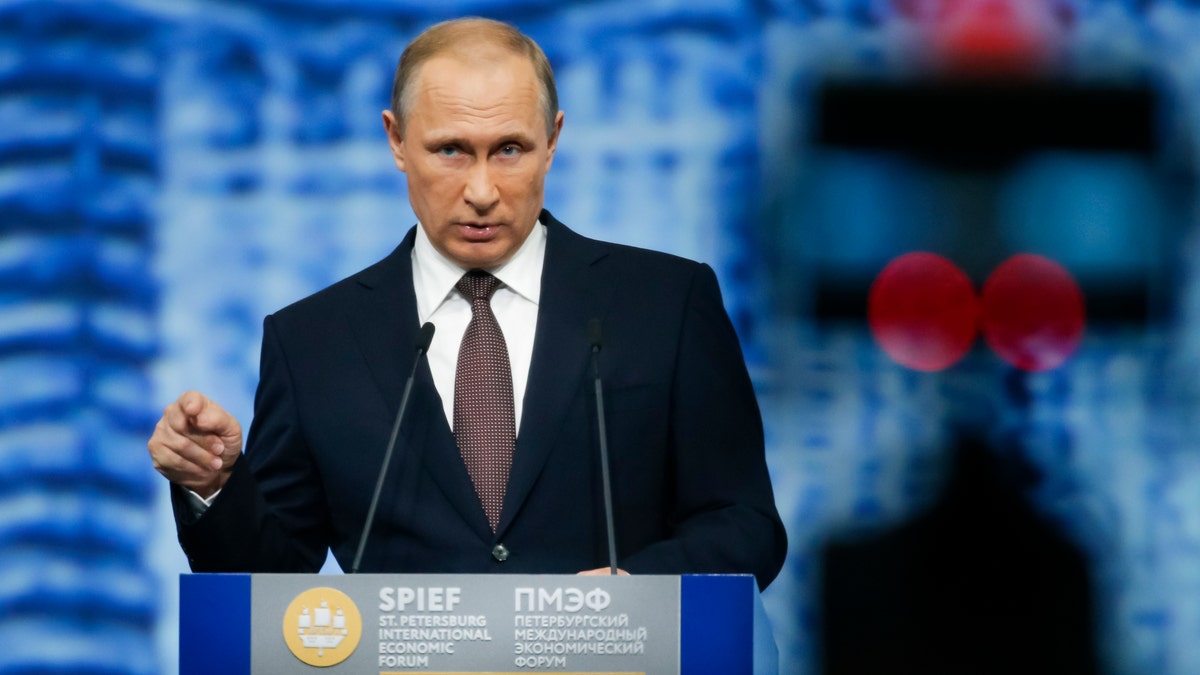
Russian President Vladimir Putin on Friday. (AP Photo/Dmitry Lovetsky)
Looking back, that really was a hell of a press conference.
As the Democratic National Convention was ending, Donald Trump went in front of cameras to urge Russia to hack into Hillary Clinton’s private emails and hand them over to U.S. news outlets.
"Russia, if you're listening, I hope you're able to find the 30,000 emails that are missing. I think you will probably be rewarded mightily by our press,” Trump declared, without a hint of humor.
The GOP presidential nominee also announced that the Obama administration’s failure to work with Russia was rooted in Russian leader Vladimir Putin’s dislike of President Obama. Putin had even called the U.S. leader the “N-word,” Trump alleged.
Later, Trump tried to slip away from critics by saying he was being “sarcastic” about having a foreign nation intrude into American presidential politics. But his comments came within days of American investigators concluding with “high confidence” that Russia broke U.S. law and hacked the Democratic National Committee’s computers.
Since then, Trump has asserted his desire to work with Russia and said “if we could be friendly with Russia – wouldn’t that be a good thing?” He similarly refused to condemn Russia for invading and taking over Ukrainian land. And earlier, he dismissed the idea that the U.S. was required to defend its fellow NATO states that are living in fear of Russian aggression, if they are attacked.
Now Trump is about to start getting regular briefings from the nation’s top intelligence agencies, as is traditional for the major parties’ presidential nominees.
Given his uncritical embrace of Russia and blind affection for its demagogic leader, there is real danger in sharing national secrets with Trump.
The greatest danger is that Trump and so many of the men running his campaign have financial reasons to share information with Russia and Putin, even at a possible cost to the interests of the U.S.
Eight years ago, Donald Trump Jr. said flatly that “Russians make up a pretty disproportionate cross-section of a lot of our [the Trump family] assets.”
Washington Post columnist George Will recently wrote that questions about “Trump’s financial entanglements with Putin and his associates [are] justified by Trump’s refusal to release his personal and business tax information.”
Trump campaign manager Paul Manafort “has long and deep reported ties to pro-Russian politicians in Ukraine,” according to Politfact. Manafort also once controlled investments for a wealthy Russian closely allied with Putin.
Retired Lt. General Michael Flynn, former Director of the Defense Intelligence Agency, is one of Trump’s top advisers. He was famously photographed sitting almost next to Putin at the head table of a gala celebrating the state-funded Russia Today, or RT, TV network.
Flynn told RT in an interview published on its website last December that the United States and Russia should work together to defeat ISIS and bring about an end to the Syrian civil war.
Also advising Trump on Russia is businessman Carter Page, who reportedly has extensive financial dealings with Russians.
Page “traveled to Moscow last week and criticized the U.S. and other Western powers for their ‘hypocritical focus on ideas such as democratization, inequality, corruption and regime change,’ in other countries,” Washington Free Beacon reporter Morgan Chalfant wrote in mid-July.
“So many people who I know and have worked with have been so adversely affected by the sanctions policy,” Page said in an interview with Bloomberg in March. He then offered hope for the end of U.S. sanctions on Russia “creating a better situation.”
With that attitude, Trump staffers changed one item in the GOP platform before their convention. As The Washington Post reported at the time: “The Trump campaign worked behind the scenes last week to make sure the new Republican platform won’t call for giving weapons to Ukraine to fight Russian and rebel forces, contradicting the view of almost all Republican foreign policy leaders in Washington.”
As Trump himself once said, falsely suggesting President Obama may have ISIS sympathies, “there’s something going on.”
And polls show the American public is catching on to Trump’s strange attachment to Putin and Russia.
A poll from YouGov published last week found that 54 percent of Americans, including 48 percent of self-described independents, say Trump urging Russia to hack Clinton's e-mails was “inappropriate.”
According to the same poll, 40 percent of Americans — and 38 percent of independents — think the GOP nominee is “too friendly towards Russia.”
Polls also show Clinton, the former secretary of state, widening her lead over Trump on the question of who would be better on foreign policy.
A CNN/ORC poll last week found that 59 percent of voters trust Clinton more to handle foreign policy. Just 36 percent favored Trump to take change of the nation’s foreign affairs.
Hillary Clinton drove home questions about Trump’s consuming affection for Putin in an interview on “Fox News Sunday” eight days ago.
“I think if you take his encouragement that the Russians hack into American email accounts, if you take his quite excessive praise for Putin, his absolute allegiance to a lot of Russian wish-list foreign policy positions…[it] leads us once again to conclude he is not temperamentally fit to be president and commander in chief,” Secretary Clinton said.
Days later, President Obama said Trump’s comments about the parents of a deceased American soldier who was Muslim made him believe "the Republican nominee is unfit to serve as president.”
"He’s woefully unprepared,” Obama said. “There has to be a point at which you say, 'Enough,'”
For voters, that point is Trump’s suspicious ties to Russia.








































